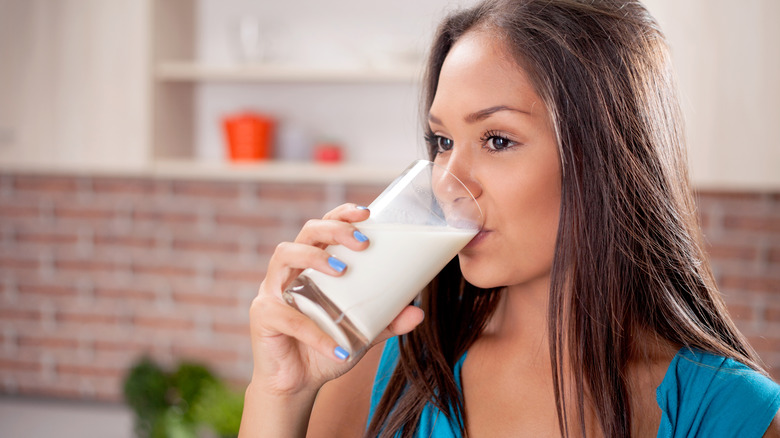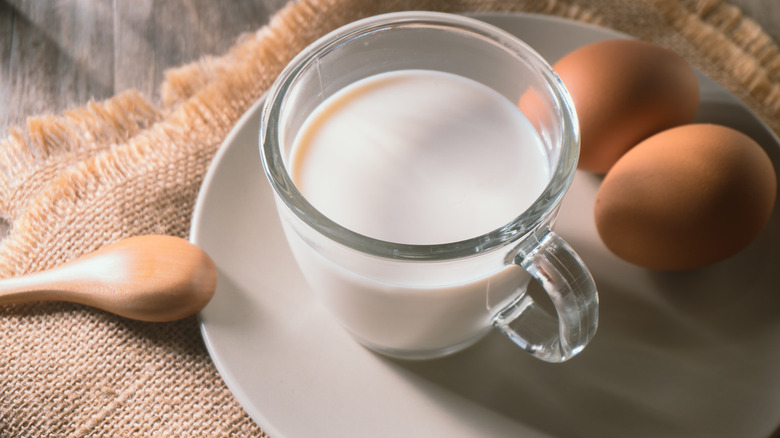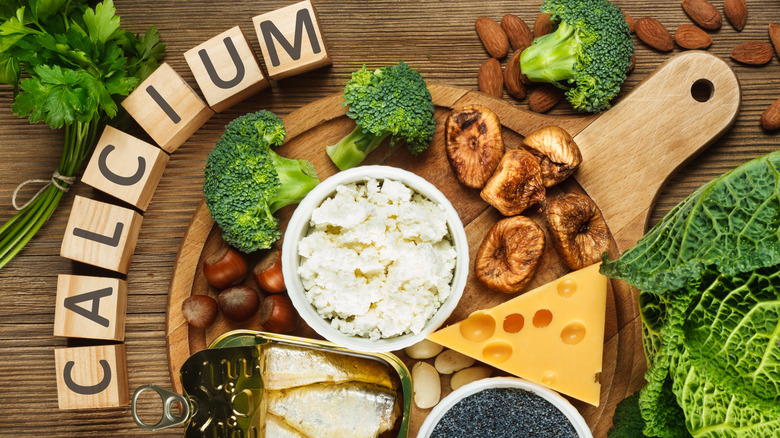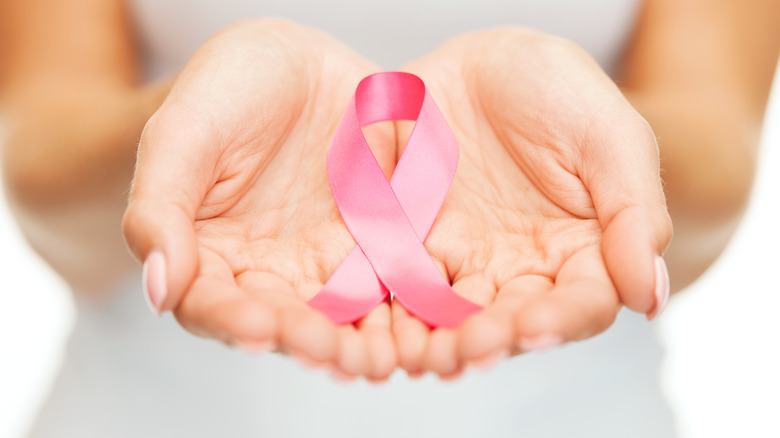Drinking Milk Every Day Does This To Your Body
These days, it's virtually impossible to know who or what to believe when it comes to healthy eating and staying fit. The tsunami of information with which we're deluged upon doing something as simple as googling "is [insert food/drink item here] good for you" means that, more often than not, it's almost easier to remain uninformed than risk trying to decipher the reasonable advice from the marketing propaganda.
The benefits of drinking milk have been extolled pretty much every day since grade school. Then, as we approached adulthood, the narrative changed, with suggestions that humans shouldn't imbibe dairy after a certain age due to its tendency to cause digestive issues, the dreaded weight gain, and much more. Likewise the variety of new-age milks on the market, from soy to almond, makes it difficult to decipher what's actually good for our bodies.
What does drinking plain-old cow's milk every day actually do to a woman's body? What are the real-life effects? What are the possible benefits and drawbacks? And should we be looking elsewhere for our sources of protein, calcium, and essential nutrients than the tall glass of the white stuff we've been conditioned to drink since we were in diapers? I asked a bunch of nutritional experts for their opinions on this hot-button topic, and the results may surprise you.
It can cause acne
Dairy is known to be inflammatory as nutritionist and dietitian Vanessa Rissetto explained, thanks to D-galactose, "a breakdown product of lactose that has been shown to be pro-inflammatory" and which milk boasts as opposed to milk products such as cheese or yogurt. This means that if you're suddenly breaking out after necking three glasses of the stuff, there's probably a connection there. Michelle Beckner, a certified nutrition coach, further warns, "Drinking milk every day, this source of inflammation can lead to acne that seems to never clear up."
It may seem like a small setback, but considering that what we put into our bodies tends to show up on our skin (as anybody who's scoffed an entire tub of ice-cream in one sitting can attest) if there's anything that can help clear up your skin, especially something as simple as cutting down on daily dairy intake, then surely it's an easy choice to make.
If you're really craving a milk fix but don't want to take the risk, Dr. Joelle Cafaro suggests "opting for more nutritious (and less processed) dairy options like plain yogurt and kefir" as an alternative to drinking cow's milk, as these products are still yummy but are less likely to make you break out.
It can cause bloating
Aside from making its presence known all over your face, those nasty rumors about dairy causing bloating might actually be worth looking into further. But is bloating only a concern for those of us who are lactose intolerant? Beckner, who has helped breastfeeding mothers of lactose intolerant babies wean off dairy, certainly doesn't think so.
According to the certified nutrition coach, severe bloating may result due to a difficulty in processing the dairy. Beckner noted that "even just a little half and half in your morning cup of coffee could leave you feeling bloated for the rest of the day." And this doesn't necessarily mean you're lactose intolerant — it's possible you have IBS or are sensitive to a different protein in dairy. This is especially pertinent as we get older and our digestive systems aren't as sophisticated as they once were. If you are one of those people who experiences bloating after consuming dairy, make sure to get checked out by your doctor to rule out health issues.
It can cause upset stomach and digestive issues
Bloating is hugely uncomfortable and may leave some of us feeling like we don't even want to get dressed or drag our butts out of bed. But, let's face it, as women we're used to a little bloating, particularly around that time of the month. A beach-ball belly isn't the worst side effect in the world. It's also not usually a cause for major concern health-wise. However, drinking milk every day might be leading to less easily-ignored issues, too.
As Beckner points out, there may be more sinister consequences to a daily glass or two of milk as "the highly pasteurized and processed milk that is on the shelves today has bacteria (both good and bad), [which] can lead to an imbalance in the gut microbe." This imbalance can cause all sorts of long-term digestive issues and even result in symptoms such as brain fog and migraines. So that pint of ice cream might cause more than brain freeze after all.
It may help with weight loss
It's not all bad news when it comes to drinking milk. At the other end of the spectrum, for those looking to get fit and tone up, drinking milk every day may encourage weight loss or even fat burning properties in women. According to Paul Salter, a registered dietitian, weight loss expert, and sports nutritionist, consuming three servings per day could yield greater fat-loss in the long term, particularly if the person in question is following a healthy diet and regular exercise routine.
Registered Sports Dietitian Amy Goodson, who practices in Dallas, Texas, agreed. She advises that for women looking to lose, or even just maintain their current, weight, "some added protein can help and milk is an inexpensive, nutrient-rich way to get it." Dr. Cafaro is even clearer, stating simply and emphatically that "women who drink milk daily are more likely to lose weight than women who do not drink milk." A little bit of bloating in exchange for weight loss isn't the worst trade off (provided you feel otherwise okay when you drink it, that is).
It's a great source of protein
If lifting heavy and being super #swoll are your primary focus, that animal protein is an ideal addition to your diet (that is, unless you're a vegan — in which case this list probably isn't for you to begin with). As Goodson advised, "Cow's milk provides one gram of high quality protein per ounce, or eight grams for eight ounces. High quality implies that it contains all the essential amino acids." Unlike, say, those hugely popular, manufactured protein powders, for example, the protein in cow's milk is coming from a natural source and hasn't been tampered with (depending on the brand, of course).
The protein in milk can also help stop overeating, too, as Goodson noted: "From a satiety perspective, protein slows down digestion, helping people get full faster and stay full longer." It's worth remembering too that all the hip new "alternative" milks that have sprung up in the past few years have considerably less protein than standard, simple cow's milk (typically less than a gram of protein per eight ounces on average, with slightly more for soy milk — a considerable difference) and therefore might not be as nutritiously dense as they initially appear.
You'll consume fewer calories, but more nutrition
If calorie counting is your jam (or you're just trying to establish better eating habits in general), you're also in luck. Milk provides extra protein for those looking to get healthy and lean, but it also provides more nutrition for relatively fewer calories overall. As Natalie Allen, an instructor of biomedical sciences at Missouri State University who's also worked extensively as a dietitian, explains that since the standard recommended serving for milk is three to four glasses a day, there's a way to get more nutrition for fewer calories with milk.
Allen explained, "An 8-ounce serving of skim (fat-free) milk has about 90 calories, so it is a lot of nutrition for [relatively] few calories." This means, essentially, that the calories are balanced out by the high nutritional content. Allen even advises heating chocolate milk, if you're craving sugar and in the mood for a tasty hot cocoa beverage but don't want to break a strict, healthy-eating streak because the trade-off here is considerably better, too.
It helps maintain muscle mass
For those ladies who are strength training in order to get some serious gains, milk can assist in that department, too. As Allen explained, "Milk helps build strong muscles with the ideal ratio of carbohydrates to protein, making it a great drink choice for active individuals after a workout." Salter agreed, adding that milk is "rich in branched chain amino acids, those that specifically play a role in muscle growth/maintenance."
The kind of protein contained in milk is important for strength training and muscle recovery, too, as Registered Dietitian Jacinda Roach explained. "The source of animal protein it contains is more readily absorbed by the body," which helps women to build and maintain lean muscle mass in the long term. Allen further extols milk's virtues as a great post-workout beverage of choice thanks to the carb/protein ratio, which helps encourage muscle recovery and repair considerably.
It's a great source of calcium
If there's one thing we all collectively remember from our childhood nutritional education, it's that milk is loaded with calcium (not to mention several other important nutrients). This is still, arguably, its biggest selling point worldwide (and bone of contention in certain conspiracy theory corners). Thankfully, this isn't something that's generally disputed in scientific circles. As Roach explained, milk is "extremely nutrient-rich because it contains energy nutrients (carbohydrate, protein, and fat) as well as vitamins and minerals (calcium and Vitamin D)."
As Goodson noted, milk contains three of the nutrients of concern for Americans as outlined by the 2015 government dietary guidelines (calcium, vitamin D, and potassium). Although calcium in particular can be obtained from other sources, milk is arguably the easiest way to get it into your system quickly. "Many think it's easy to get calcium from other foods but the truth is you have to eat ten cups of spinach to obtain the calcium found in one 8-ounce glass of cow's milk," Goodson advised.
It might not afford many benefits without magnesium
Without magnesium to balance it out, we might not be getting the full benefits of the calcium naturally found in cow's milk. As Dr. Barry Sears, a leading authority in anti-inflammatory nutrition and the author of the Zone Diet book series, explained, "If one is drinking milk every day, then you should ensure that you are getting adequate magnesium either by the diet (hard) or by supplementation (easier) to balance the calcium."
This is because bone is made up of both calcium and magnesium. So in order to keep our bones healthy and strong, we need to ensure we're keeping stores of both plentiful as Sears explained, "an imbalance in the ratio of these minerals will decrease bone strength" over time. Rissetto noted that, according to a recent study in the British Medical Journal, there may be significant evidence that milk actually leeches calcium from the bones.
It helps the aging process
Women experience a pronounced decrease in metabolic rate as we age. As Salter explained, bone strength also decreases with age, increasing the risk of osteoporosis. However, the combination of calcium and vitamin D obtained by drinking milk plays a synergistic role in enhancing bone mineralization as we age. Likewise, Salter suggested to keep in mind that "sarcopenia, the age-related loss of muscle mass, is more pronounced in women versus men."
Roach agreed with Salter's summation, suggesting that "drinking milk daily can help a woman to strengthen her skeletal structure and prevent osteoporosis." Allen, though, warns that the most pertinent time to drink milk, particularly if you're concerned about osteoporosis in later life, is up to the age of 30, as it's during these early years of development that "bones gain mass and build structure." Goodson also pointed to the vitamin D found in milk to maintain bone strength and muscle mass as we get older.
It could protect against diseases
Unsurprisingly, given its impressive genetic make-up of essential nutrients and vitamins, milk isn't just good for bone health, potential weight loss, and maintaining muscle mass over time. There's evidence to suggest, as Cafaro noted, that because many of its nutrients are located in its fat content (such as vitamins A, K2, and omega-4 fatty acids) it could "protect against diseases like diabetes, cancer, and heart disease" too.
However, Rissetto pointed to the aforementioned study in the British Medical Journal, noting that although it didn't prove increased bone health in participants it did find that "fermented milk products (cheese and yogurt) significantly decreased mortality and fractures among [them]."
Rissetto also noted that the study found "for each serving of [these] products, the rate of mortality and hip fractures was reduced by 10-15 percent." So, if we're to take this study into account, maybe milk is best for protecting against life-threatening diseases when chewed as cheese or thickened up as yogurt?
It may lead to an increased risk of cancer
With all of potential milk has to protect against certain diseases, there's also research to suggest that drinking milk every day might also be dangerous to women's long-term health. Cafaro pointed again to the British Medical Journal study, which suggests that women who consumed three or more glasses of milk a day had a "44 percent increased risk of cancer, a 16 percent increased risk of bone fracture, and a 60 percent increased risk of hip fractures." Further, women who drink or two or more glasses a day are "twice as likely to be diagnosed with ovarian cancer than women who rarely drink it."
We also need to be careful about which milk products we choose, as Cafaro notes regular cow's milk contains growth hormones, which also lead to an increased risk of breast and other cancers. Basically, the purer the better. Cafaro advised to choose "organic products made with milk from grass-fed, pasture-raised animals because the milk is of higher nutritional value." If drinking regular milk, choose full-fat, which is actually less processed than its low-fat counterpart.












